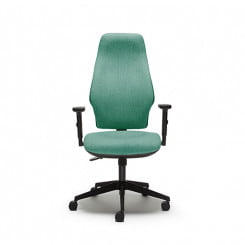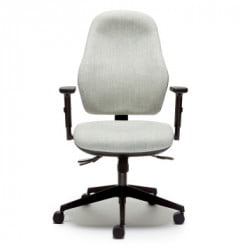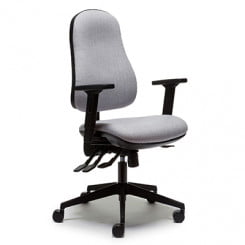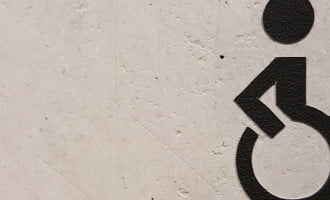Most of us know that working behind a desk all day and sitting for long periods of time often causes discomfort and most commonly back pain. But did you know that the pain you’re experiencing could be a prolapsed disc?
What is a prolapsed disc?
A prolapsed disc (slipped disc) is where a cushion of tissue between the bones of your spine pushes out of place causing pain the back.
Signs and symptoms of prolapsed disc
The biggest sign of a slipped disc in the back is back pain. But you might also experience symptoms such as:
- Neck pain
- Muscle weakness
- Tingling sensations in the shoulders, back, arms, hands, legs or feet
- Difficulty bending down or straightening your back
- Sciatica
- Pain feels worse at night
- Unable to walk short distances without experiencing pain
Sciatica
Sciatica is when the sciatic nerve, which runs down from the lower back to feet, gets irritated or compressed. Some symptoms that might come with sciatica are shooting, tingling or numbness in the back of the leg, bottom or feet.
Sciatica is often the result of a slipped disc. A prolapsed disc can press into the Sciatic nerve and can trigger pain.
To help relieve discomfort, gentle exercises and stretches can be performed.
If someone is experiencing Sciatica as well as a prolapsed disc, extra precautions should be taken.
Ways that you can prevent Sciatica caused by a prolapsed disc are:
- Avoid heavy lifting
- Don’t sit for prolonged periods of time
- Maintain lumbar arch when bending down (keep knees bent when picking up something off the floor)
Causes
Prolapsed discs are most common in people over 30 years old. Here are some of the main causes for a prolapsed disc:
- Aging:
Aging causes discs to become less flexible and are more prone to tearing. Aging-related wear and tear, called disc degeneration, is the most common cause of a slipped disc.
- Heaving lifting:
Jobs that involve a lot of lifting of heavy objects. Lifting heavy things, especially incorrectly, can damage the body and put strain on the back, causing a slipped disc.
- Sitting too much:
Sitting down for long periods of time frequently and driving for long hours can cause a prolapsed disc. Sitting down too much and having an inactive lifestyle puts a lot of pressure on the spine and back.
- Smoking:
Smoking causes the discs to become weak and more likely to tear. Check out this blog post by very well mind for more details on why smoking causes disc degeneration.
Things you can do to help relieve a prolapsed disc
- Exercise: Try and do some gentle exercise regularly and gradually increase you level of activity. Take a look at these blogs for some exercise suggestions- NHS, Medical News Today, Spine-health.
- If pain is too severe painkillers can be taken.
- If you work on a desk sitting down for long periods of time, we recommend an ergonomic chair that supports your back and helps to relieve pain.
Office chairs for someone with a prolapsed disc
Sitting for prolonged periods of time can cause symptoms to get worse, but if your job requires you to sit down all day, such as office jobs, you can get chairs that help to minimise feelings of discomfort.
The Orthopaedica chair series Is an affordable option of ergonomic office chairs for those suffering with a prolapsed disc and back pain. It’s a highly adjustable chair with a contoured back rest that sculps to perfectly fit your back. Another bonus is that you can chose to add a coccyx cut-out to help relieve pressure from the lower back and tail bone so if the user is suffering with Sciatica it helps to provide relief and make sitting for long periods of time more comfortable. An AirTech seat can be added to give extra support to the thighs and height adjustable arm rests to reduce strain on arms and shoulders.
The great thing about the Orthopaedica series is that there are three chair options for different body types and heights. The Orthapaedica 90 is the smaller option which is suitable for someone who is 5’3 and under, the Orthapaedica 100 is suitable for someone of an average height and the Orthapaedica 300 is great for someone taller as the back is much higher, and the seat width is wider.
-
 Orthopaedica chair 300 Series£643.20 (incl VAT)
Orthopaedica chair 300 Series£643.20 (incl VAT) -
 Orthopaedica chair 100 Office Chair£591.60 (incl VAT)
Orthopaedica chair 100 Office Chair£591.60 (incl VAT) -
 Orthopaedica chair 90 Office Chair£448.80 (incl VAT)
Orthopaedica chair 90 Office Chair£448.80 (incl VAT)
If you would like some advice on what ergonomic office chair to choose, please get in touch. You can contact us by phone on 0330 332 0880 or email enquiries@posturepeople.co.uk.







